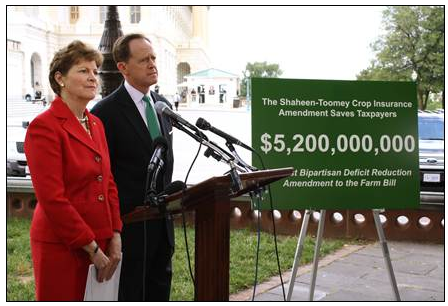SENS. SHAHEEN AND TOOMEY URGE REFORM TO EXCESSIVE CROP INSURANCE PROGRAM
Joined by environmental and taxpayers’ groups today to promote amendment, which would save $5.2 billion

Sens. Shaheen and Toomey take questions at a press conference today outside the U.S. Capitol.
WASHINGTON, D.C. – U.S. Senators Jeanne Shaheen (D-N.H.) and Pat Toomey (R-Pa.) today urged the Senate to support their bipartisan amendment to end excessive federal crop insurance subsidies for large American farming operations.
The Shaheen-Toomey amendment would cap crop insurance premium subsidies at $40,000, reducing the deficit by about $5.2 billion over 10 years, according to Congressional Budget Office estimates.
Under the amendment, producers would still have full access to the crop insurance they need, including plans with premiums of more than $40,000. Less than 4 percent of producers would have been affected by a $40,000 premium support limit in 2011, according to the Government Accountability Office.
Premium subsidies to farmers are not currently subject to limits or means testing. In 2011, 26 farm businesses received a total of more than $1 million to reduce the cost of their crop insurance premium, and more than 10,000 farm businesses received more than $100,000.
“Large farms simply don’t need unlimited government support to pay for crop insurance. Capping these premium supports will cut the deficit while ensuring farms continue to have access to insurance. It’s just common sense,” Sen. Shaheen said.
“There’s no reason why the federal government should be spending more than $1 million, in some cases, to subsidize premiums for large commercial farms. With annual deficits exceeding $1 trillion, this open-ended entitlement needs to be reined in. Washington needs to work to bring our deficit under control, and our amendment offers us the opportunity to save more than $5 billion and make common-sense reforms to a bloated federal program,” Sen. Toomey said.
The Shaheen-Toomey amendment enjoys the support of numerous environmental and fiscal-watchdog groups, including the Environmental Working Group, Taxpayers for Common Sense, the Council for Citizens Against Government Waste, the National Sustainable Agriculture Coalition, the National Taxpayers Union, and the U.S. Public Interest Research Group.
“The Shaheen-Toomey amendment simply proposes the same payment limitations that have been applied to direct payments for years. This makes perfect sense as crop insurance has become the primary farm safety net,” said Scott Faber, vice president of government affairs at the Environmental Working Group.
“With years of record farm profits in the banks, it’s past time to rein in the gold-plated crop insurance subsidy program. Sens. Shaheen and Toomey’s common-sense approach of limiting Uncle Sam’s individual premium subsidies to $40,000 would save taxpayers billions a year and maintain an adequate and appropriate safety net. It wouldn’t affect the vast majority of farmers and wouldn’t deny crop insurance, just the exorbitant subsidies,” said Ryan Alexander, president of Taxpayers for Common Sense.
The federal crop insurance subsidy program was created in 1980 and expanded in 2000 to encourage farmers to purchase private crop insurance and avoid reliance on post-disaster federal support. To encourage wider use of crop insurance, Congress increased subsidies for farmers and crop insurance companies and agents.
The average portion of crop insurance premiums paid by taxpayers increased from 37 percent in 2000 to more than 60 percent in 2011. The total cost of the crop insurance premium subsidy program has also increased – from $2 billion in 2001 to $9 billion in 2011. During the next ten years, CBO estimates the crop insurance program will cost taxpayers more than $90 billion.
Press Office, (202) 224-5553